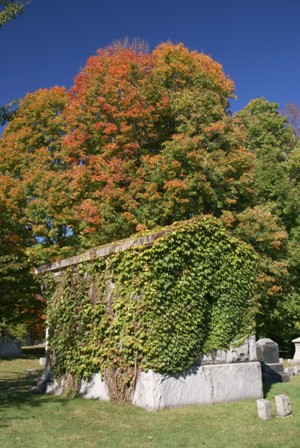Unless you love poetry, you probably only remember the words of a handful of poems you were forced to learn in elementary school. I’d be willing to bet that one of them ends with:
“And miles to go before I sleep.”
Those words, from “Stopping by Woods on a Snowy Evening”, often come to my mind when I’m traveling, and on Day 2 of my New England trip, I still had hundreds of miles to go, through the heart of New England, the land that poet Robert Frost once called home. And now, as I arrived in the village of Old Bennington, Vermont, I was about to pay a visit to the great poet. Though at the time, I didn’t know it.

Yes, I rhymed those last two sentences on purpose. I apologize. Now… where were we?
Oh yes, I was driving into Old Bennington, a tiny community that’s charming enough to make just about anyone sell their house and become a New Englander. Vermont Route 9 arrives in the village with a view of the Old First Church, built in 1806, and restored in 1937. Frost lies in eternal slumber, just behind the church.

Just before you get to the church, there’s also a big, old, creepy house that hasn’t been painted in decades, and has fallen into some disrepair. This is just one of the dozens of historically important buildings in the Bennington area. It’s the Walloomsac Inn, the oldest inn in Vermont.

As I drove into Old Bennington, I stopped and parked in front of the Old First Church, thinking it would make for a few good pictures. Then I noticed the cemetery…

… and the beautiful fall colors that surrounded it. This all seemed nice, but it hardly warranted the number of tour busses that were unloading out front. Fortunately, it wasn’t difficult to figure out why everyone was here.

The path to Robert Frost’s grave is well marked, and well trodden. It does not diverge, but does make several turns. There are signs everywhere, to keep you from having to make any decisions yourself.

Somewhere beyond the rows of ancient tombstones…

… are these three simple graves. The poet’s is in the middle, entombed with his wife and several other members of the Frost family.

Visitors have left pennies on top of his grave, perhaps a reference to another Frost poem — one that I didn’t learn in elementary school:
Nature’s first green is gold,
Her hardest hue to hold.
Her early leaf’s a flower;
But only so an hour.
Then leaf subsides to leaf.
So Eden sank to grief,
So dawn goes down to day.
Nothing gold can stay.





No comments